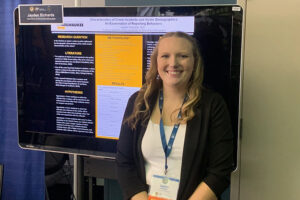
It’s not just banned books that librarians are dealing with today – it’s Internet filters, invasions of privacy and Internet censorship.
That’s the view of Barbara Jones, director of the American Library Association’s Office for Intellectual Freedom. Jones is scheduled to speak at the Milwaukee Public Library’s Centennial Hall, 733 N. Eighth St., on Sunday, Sept. 22, at 6 p.m.
Jones’ talk, “Canaries in the Coal Mine: How Libraries Fight for Free Speech, Freedom from Surveillance and Democratic Values,” kicks off Banned Book Week, Sept. 22-28. The talk is presented by the University of Wisconsin-Milwaukee’s School of Information Studies and Center for Information Policy Research in partnership with the Milwaukee Public Library.
Barriers multiplied
“I think the biggest challenge we face is that there are so many barriers,” says Jones, “and the barriers are so complex now. It’s one thing to remove a book from the shelves; it’s another to filter the Internet. People don’t know what information they’re not getting.”
One of the biggest challenges is the subtle invasion of privacy posed not only by government agencies like NSA (the National Security Agency), but the information collected by commercial interests through Facebook, Google and other online interactions, says Jones. “It’s creepy, but also dangerous…it’s an invasion of our democratic values.”

As for the banned books themselves, young adult books, which are considered “dark,” are among those most frequently challenged, says Jones. “Many young adult books that talk about themes like suicide, drugs, sex or other issues facing teens are among those frequently challenged. The books are often challenged over one scene or a few words.”
For example, she mentions challenges to Sherman Alexie’s “The Absolutely True Diary of a Part-Time Indian.” “It received critical acclaim, and the theme is about a young person, a Native American who makes it in life; breaks out of a dysfunctional situation. What could be better than that for a Native American high-schooler, but one community in Missouri removed it because of five words out of the entire book.”
“Good books are powerful, but they don’t make people racists or suicidal,” she adds.
Privacy and the Patriot Act
The Patriot Act has provided some particular challenges, says Jones, since it originally allowed the FBI to search library records without the knowledge of the librarian or the person whose records were being searched. Now librarians are informed, but “the Patriot Act requires libraries to give up records with very little indication of why. It’s a very important, serious problem.”
The American Library Association (ALA) provides libraries with a continually updated manual of best practices in dealing with intellectual-freedom issues, and is now working on the ninth edition.
The work of the ALA and libraries is both reactive and proactive, says Jones.
In addition to protecting patrons’ intellectual freedom, an increasing number of libraries are moving to encourage dialogues that contribute to a democratic society. “More and more libraries are becoming community centers and encouraging civic engagement through discussion groups about such issues as Obamacare.” And, if someone wants to check out a fact– well, they’re right in the library, she adds.
Jones own favorite banned book is “To Kill a Mockingbird,” but she’s also a fan of Huck Finn, “Catcher in the Rye” and “The Absolutely True Diary of a Part-Time Indian.” “They’re great. They’re powerful. They resonate with people. Why are we creating barriers to such great and powerful writing?”
The Milwaukee Public Library said in a statement about Banned Books Week:
“The Milwaukee Public Library is committed to upholding the principles of intellectual freedom and the right of every Milwaukee citizen to free inquiry without censure. Milwaukee Public Library collects materials representing the widest diversity of views and expressions and leaves judgments of moral, political and aesthetic value to each individual.
Banned Books Week is an annual event celebrating the freedom to read, and Milwaukee Public Library is proud to join in this celebration. Our Banned Books Week programs and displays build awareness of the importance of free expression and the dangers of censorship. While we highlight the freedom to read during Banned Books Week, we are dedicated to upholding the principles of intellectual freedom year round.”



